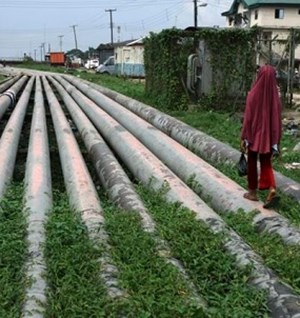Nigeria looks to diminish $4 billion per year oil theft
(Bloomberg) — Africa’s biggest crude producer is preparing a crackdown on oil theft as part of an ambitious recovery plan to boost output that’s fallen by more than a quarter in two years.
Nigeria loses as much as 150,000 barrels of oil a day to criminals who illegally tap pipelines crisscrossing the Niger Delta region, Nigerian Upstream Petroleum Regulatory Commission Chief Executive Officer Gbenga Komolafe said in an interview. At current prices, the missing barrels are worth about $4 billion a year.
President Muhammadu Buhari’s administration recently approved measures aimed at containing the illegal activity, according to Komolafe. “Pretty soon you will see a reverse in that trend,” he said, declining to provide further details on the “security strategy.”
Nigerian production fell last year to fewer than 1.5 million barrels a day of crude equivalent in December from about 1.7 million barrels in January, according to NUPRC data. That’s lower than the quota set by OPEC+ for Nigeria.
“We are actually targeting three million barrels a day,” Komolafe said at the NUPRC’s offices in Abuja, the capital. Such an extensive turnaround, however, will require more significant measures than a reduction in crude theft.
Despite rising oil prices, government revenue from oil through November was about half the amount anticipated, according to Nigeria’s Budget Office. At the same time, oil majors such as Shell Plc and Exxon Mobil Corp. are looking to sell their remaining onshore and shallow water assets in order to focus on deep water projects, leaving the industry reliant on local producers.
“We are doing everything to get investors to get interested in making investments,” Komolafe said.
In May, the award of 57 so-called marginal fields was made to 161 domestic companies with about 80% of winning bidders meeting a payment deadline, according to Komolafe. Some domestic producers that have already acquired permits from retreating international companies “have demonstrated capacity and done well,” he said.



